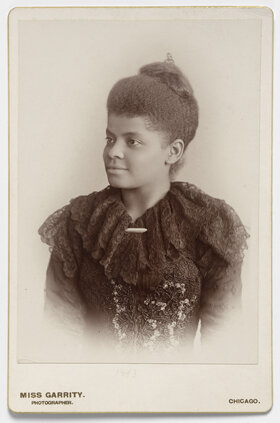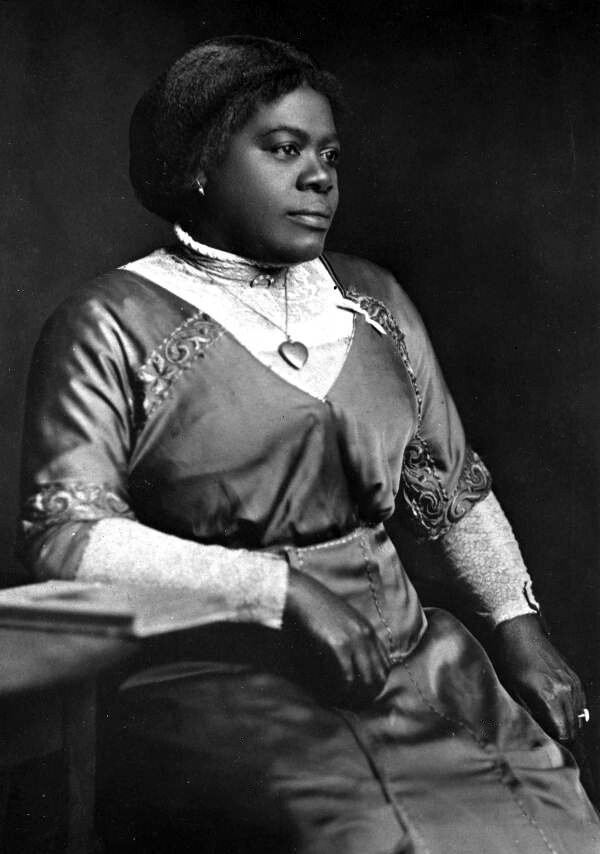The Black Women Pioneers in US Methodism
Ida Bell Wells-Barnett (1862-1931)
A portrait of Ida B. Wells-Barnett circa 1893. Albumen silver print by American female photographer, Sallie Garrity. Photo from the National Portrait Gallery, courtesy of Wikimedia Commons.
Ida Bell Wells was born into slavery in Holly Springs, Mississippi, in the midst of the U.S. Civil War. She would go on to become a pioneering journalist, anti-lynching activist, suffragist and crusader for justice for women and people of color.
After emancipation, her parents were active in the Freedmen’s Aid Society of the Methodist Episcopal Church, which established Rust College, the oldest of the historically Black colleges and universities. Ida began her advanced education at Rust College, however, the death of her parents and a younger brother from a Yellow Fever outbreak in 1878 led her to leave college and take a job as a teacher to support her siblings.
One of the results of Reconstruction in the South had been integration of all public facilities, including transit. Not all transit companies complied, however. In 1884, while seated in a “ladies car” (for which she had purchased a ticket) on a train bound for Memphis, she was asked to move to a smoking car to accommodate a white woman. She refused. When the conductor started to drag her from the car, she bit him. She was ultimately forcibly removed from the train. She sued the railroad, initially winning her case, but losing it on final appeal in the Tennessee Supreme Court. The story made headlines and helped launch her journalism career. The 25-year-old schoolteacher who sued a railroad company became a sought-after writer.
In 1889, she became a partner in Free Speech and Headlight, a Memphis newspaper with wide circulation among Black and Christian audiences. This launched another career focus: the investigation, exposure and crusade to end lynching in the South. Following the lynching of three friends in Memphis, Wells-Barnett wrote arguably her most important work, “Southern Horrors: Lynch Law in All Its Phases.”
Her fearless criticism of lynching forced her to leave Memphis in 1892 for a less dangerous home base in Chicago. There, she worked alongside Jane Addams to block segregation in Chicago’s public schools and was one of the most seasoned veterans in the fight for women's suffrage. During the landmark 1913 national suffrage parade in Washington, fellow suffragists asked Wells-Barnett not to walk alongside them, fearing alienating white support. But when a mob overtook the parade route and began beating women marchers, Wells-Barnett rejoined her fellow suffragists in the chaos.
While Chicago would be her home for the rest of her life, she remained highly sought-after nationwide as a speaker, mentor and organizer with pro-suffrage, pro-civil rights and anti-lynching organizations. She also became one of the two Black female co-founders of the NAACP — though considered by many to be too radical to hold leadership. She remained active in urban reform in Chicago until her death in 1931.
Learn More
Ida B. Wells-Barnett (Arlisha Norwood, National Women’s History Museum)
Ida B. Wells-Barnett and Her Passion for Justice (Lee D. Baker, Duke University)
Ida B. Wells (National Park Service)
Mary McLeod Bethune (1875-1955)
Portrait of Mary McLeod Bethune, Daytona Beach, Florida, circa 1915, courtesy of the State Archives of Florida, Florida Memory.
Mary McLeod Bethune was one of the most significant educators, leaders, government officials and advocates for civil rights of the 20th century.
One of the youngest of 17 children, she was born in South Carolina to former slaves.
Completing her education at Scotia Seminary and the Moody Institute for Home and Foreign Missions, McLeod had intended to become a missionary. However, no one would send her as a missionary, so she focused her efforts on education and teaching school. She married another teacher, Albertus Bethune.
After the end of that marriage, McLeod Bethune started her own educational institution, a school for girls in Daytona, Florida, that would, in 1931, merge with Cookman Institute and become Bethune-Cookman University. The quality of education offered there, combined with McLeod Bethune’s leadership in advocacy and youth organizations, gained the attention of the Roosevelt White House. In 1936, she was appointed the director of Negro Affairs of the National Youth Administration, a position she would hold until 1944.
In addition to her legacy in education, McLeod Bethune actively campaigned for civil rights and fought to end discrimination and lynching.
While in government service, she became vice president of the NAACP in 1940, an office she would continue to occupy until her death in 1955. She was responsible for overseeing the integration of the Women’s Army Corps in 1942, and, under President Truman in 1945, was appointed as the only Black woman to be present at the founding of the United Nations. She was a successful businesswoman in the hospitality and insurance industries.
As a Methodist leader, she was a lay delegate to General Conference four times, advocating for the elimination of the segregated Central Jurisdiction.
Learn More
Mary McLeod Bethune (Dr. Debra Michaels, National Women’s History Museum)
Methodist Women’s History: Mary McLeod Bethune (UMC.org video)
Education and Equality: The Work of Mary McLeod Bethune (United Methodist Women)
Mary McLeod Bethune (General Commission on Archives and History)
The Rev. Sallie A Crenshaw (1900-1986)
Sallie A. Crenshaw was one of the first ordained African-American Methodist women and missionary to Appalachia. Photo courtesy of The Bethlehem Center.
Sallie A Crenshaw was ahead of her time, serving as a missionary and pastor when ministry was limited for women, especially Black women.
She studied at several Methodist schools, including Gammon Theological Seminary and Clark College (now Clark Atlanta University), and was the first Black student to attend Tennessee Wesleyan College.
In the 1930s, she became a licensed preaching missionary, which allowed her to serve in ministry despite prohibitions against the ordination of women. She later became one of the first two Black women ordained in the Methodist Episcopal Church. In 1958, two years after The Methodist Church approved full clergy rights for women, she was one of the first two Black women to receive those rights as a full clergy member of the East Tennessee Conference in the racially segregated Central Jurisdiction. Crenshaw also is noted as one of the first Black clergywomen in the Holston Conference and the Southeastern Jurisdiction.
Crenshaw served as a missionary to Black coal miners in the Appalachian coalfields of Virginia and later pastored churches in poor neighborhoods in East Tennessee. She also is remembered for her mission work in the Chattanooga area, offering Bible studies, Sunday school classes and feeding programs for children. Seeing a need to care for children while their parents worked, she founded the Good Shepherd Fold daycare in Chattanooga in the late 1940s. The daycare became The Bethlehem Center and for a time was called The Sallie Crenshaw Bethlehem Center. The center, which celebrated its centennial in 2020, continues to serve the community and is a lasting legacy of her leadership in the region.
Learn more:
Sallie A. Crenshaw (General Commission on Archives and History)
Rev. Sallie Crenshaw was a woman ahead of her time (Chattanooga Times Free Press)
Bishop Leontine Turpeau Current Kelly (1920-2012)
United Methodist Bishop Leontine Turpeau Current Kelly preaches during evening worship at the first reunion of the former Central Jurisdiction of the Methodist Church in College Park, Ga., in 2004. Kelly died at age 92 on June 28, 2012. File photo by Mike DuBose, UM News.
Leontine Turpeau was raised in a family of leaders. Her father, the Rev. David Turpeau, was a Methodist pastor and a member of the Ohio House of Representatives. Her mother, Ila Marshall Turpeau, was an outspoken advocate for women and Blacks and was founder of the Urban League of Cincinnati. One of the leaders who would occasionally visit the Turpeau home was Dr. Mary McLeod Bethune (link to part 1). She remembers being told by McLeod Bethune, “You must plan to be somebody.” Those words stuck.
When her second husband, the Rev. David Kelly, died, the congregation her husband served asked for her to be their next pastor. At the time, she was a certified lay speaker and did not feel qualified or called to pastoral ministry. That would change a few months later, and by the end of the year, she completed licensing school and began the Course of Study at Wesley Theological Seminary. She was ordained a deacon in 1972 and an elder in the Virginia Conference in 1977. She went on to become the Associate Program Council Director of the Virginia Conference, and later head of the evangelism division of the United Methodist Board of Discipleship.
In 1984, while a member of the Southeastern Jurisdiction, the Western Jurisdiction elected her bishop. She became only the second female bishop in the history of The United Methodist Church, and the first African American female bishop of any major denomination in the world. Retired Bishop Melvin Talbert, who also served in the Western Jurisdiction, remembers her election to bishop as groundbreaking. "I remember some of my colleague bishops in the Southeastern Jurisdiction were adamantly opposed to her election," he said.
Assigned to the California-Nevada Conference, Bishop Kelly’s influence would reach across the globe, as she was a founding member of the Africa Initiative, which in 1988 established Africa University, the first United Methodist university on the African continent.
Her lasting influence on all of those around her cannot be underestimated. Retired Bishop Sharon Brown Christopher put it this way: "Bishop Leontine Kelly has been the spiritual mother of many clergywomen and especially the women bishops. She called us into futures we never anticipated for ourselves, would not let us capitulate to our insecurities and druthers, and coaxed us into new lives that gave new leadership to The United Methodist Church. Her feisty, God-centered spirit is embedded deeply in our souls and will continue to form and instruct us."
Learn More
Leontine Turpeau Current Kelly (General Commission on Archives and History)
Bishop Kelly on Faith (UMTV video: Bishop Kelly on Faith)
Bishop Leontine Kelly dies at 92 (UM News)
Leontine T.C. Kelly: National Visionary (National Visionary Leadership Project)




